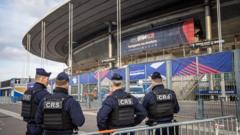Paris is bracing itself for significant security measures as the nation prepares for a high-stakes football match on Thursday between France and Israel. Authorities have mobilized thousands of officers and security personnel aimed at preventing any disruptions, an imperative heightened by violent incidents that unfolded last week in Amsterdam involving Maccabi Tel Aviv fans.
Paris police chief Laurent Nuñez has confirmed that a total of 4,000 police officers will patrol the area surrounding Stade de France. Approximately 2,500 of these officers will be stationed at the stadium itself, while others will monitor public transport and key sites across the city. In addition to police presence, about 1,600 private security guards will be on duty at the venue, alongside a specialized anti-terrorism unit tasked with ensuring the safety of the visiting Israeli team.
The stakes for this UEFA Nations League fixture are incredibly high, not only because of sporting rivalries but also due to an increasingly fraught geopolitical backdrop. Following the tumultuous scenes in Amsterdam, where violence against Maccabi Tel Aviv supporters was reported, political leaders across Europe have been vocal about a resurgence of antisemitism, prompting rigorous security evaluations.
The upcoming match is expected to draw only limited Israeli supporters, as the Israeli government has advised against traveling to Paris. Despite this, the stadium has a capacity of 80,000 but will see only a quarter of that filled—with approximately a hundred Israeli fans anticipated due to safety concerns.
In light of the Amsterdam violence, notable political figures, including French President Emmanuel Macron and Prime Minister Michel Barnier, plan to attend the match as a show of solidarity with the Jewish community. However, protests from pro-Palestinian groups and far-left factions have emerged, calling for the cancellation of the match amidst ongoing tensions in the Middle East.
The unrest in Amsterdam involved reported vandalism by Maccabi fans as well as escalating tensions between various groups. While France's notorious Stade de France previously witnessed chaos during the 2022 UEFA Champions League final, other recent high-profile events have been conducted without incident.
Calls to suspend the match have grown, but authorities, including Interior Minister Bruno Retailleau, maintain that such actions will not be entertained. The conflict between Israel and its neighbors has put immense strain on France’s diplomatic relations with Israel, further complicating the context surrounding the football event.
As the match day approaches, identity checks and increased security protocols will be in place, with local establishments instructed to close in the early afternoon to ensure public safety. With competing narratives and growing societal tensions, this match is set to serve as a focal point for discussions on broader issues of politics and identity in the region.


















